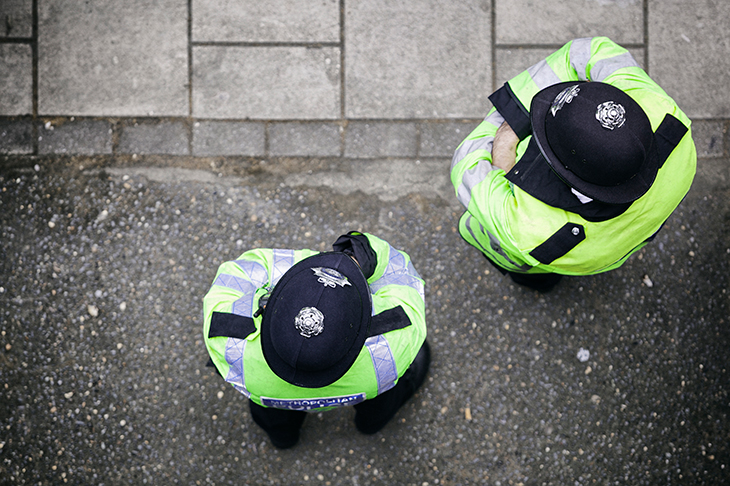The past decade has not been kind to those we entrust, in the words of Sir Robert Peel, ‘to give full-time attention to duties which are incumbent on every citizen’. Since 2010, police numbers have fallen by more than 20,000, with too many choosing to leave the force owing to physical and emotional assaults in a stressed and underfunded job.
I can sympathise, because I had to step away from the front line and the job I loved three years ago. At the time, friends and family repeatedly asked me why I felt I had to leave. Set against the latest news of escalating assaults on police, I’m not so sure they’d ask now.
There were approximately 31,000 assaults on officers last year, an increase of almost 5,000 on the year before. Barely any make the news — despite the stab and slash wounds, broken bones and close calls.
The past fortnight has been especially cruel — and has exposed the risks that police officers face. Charges have been brought for the attempted murder of PC Stuart Outten in a machete attack in London; the attempted murder of PC Gareth Phillips in Birmingham; and the murder of PC Andrew Harper in Berkshire.
Growing up, I considered myself to have had a fairly decent dose of life experience: I’m state-educated, have friends from across the social spectrum, was in the first generation of my family to go to university, and have an interest in social policy. How ignorant I was. It was only through policing that I discovered the full spectrum of what modern Britain looks like and how, at worst, it behaves.
I saw everything, from utter and abject poverty, in which children stand little chance of a decent life, to the abuse and exploitation of the young and the elderly, and the reality that police are often the ones left ‘holding the baby’ — literally and metaphorically — outside of office hours.
On the front line you also learn to expect verbal abuse and hostile words from some: ‘Rory, Rory, Rory, you racist white faggot pig’ was what one violent prisoner shouted at me for what felt like an eternity. Violence against colleagues is always painful to witness: the broken jaw that means they get Christmas off for a change, but can’t laugh or enjoy dinner with their family for example. Then there was the colleague who, having come face-to-face with the barrel of a gun at point-blank range, sometimes bursts into tears when he gets home and sees his children.
My own service — like that of many — featured close calls, broken bones and plenty of bruises. On one occasion, my colleagues and I were confronted by a man armed with an axe.
But for all the hostility and violence the police face, it is more than matched by the compassion and care that the vast majority of officers show to the public — even if that rarely makes headlines.
One colleague of mine bought and cooked dinner for an elderly victim, out of his own pocket. Others volunteered their spare time to help support the Police Cadets, the burgeoning Mini Police, and other groups that create positive relationships and make our communities safer.
There are also the more insidious factors that can eat away at the lives of those in the police force. Traumatic experiences can turn a happy, enthusiastic person into a shadow of their former self. Jobs range from sifting through thousands of indecent images of children, to repeatedly dealing with the dying or dead. Then come the complaints and misconduct procedures which, whether for serious or minor allegations, can hang over officers for years. Sincere, conscientious types tend to be the worst affected. The complaints system offers little or no appreciation for honest mistakes, nor does it place enough value on swift resolutions.
Meanwhile, we have yet to address seriously whether our existing unarmed model of policing is fit for purpose. Tasers are still not routinely provided to all those on the front line. The lethal gun and grenade ambush of PC Nicola Hughes and PC Fiona Bone in Manchester in 2012, when they were responding to a report of a burglary, could have been a watershed moment. It was an opportunity to reappraise how we can better equip our officers for the threats they face. But the response from many in the wake of the attack was the old refrain that ‘now is not the time’ to confront these issues. It never seems to be the right time.
If our politicians are serious about reasserting the rule of law, it will take more than the 20,000 police officers and 10,000 prison spaces which have been promised. If I were writing a to-do list for the new Home Secretary, it would include the restoration and renewal of proactive community policing, a significant stepping up of the effort to tackle serious and organised crime, the roll-out of Tasers across the country and a review of our model for armed policing, a radical overhaul of complaints procedures, and a policing covenant that provides support for the police and their families.
While the promises of more police, more prison capacity and a review of sentencing are all welcome and necessary, they must only be the beginning. Now is the time to move beyond crowd-pleasing headlines and deliver a serious renewal. The men and women who make up our thin blue line deserve nothing less.
Got something to add? Join the discussion and comment below.
Get 10 issues for just $10
Subscribe to The Spectator Australia today for the next 10 magazine issues, plus full online access, for just $10.
You might disagree with half of it, but you’ll enjoy reading all of it. Try your first month for free, then just $2 a week for the remainder of your first year.














Comments
Don't miss out
Join the conversation with other Spectator Australia readers. Subscribe to leave a comment.
SUBSCRIBEAlready a subscriber? Log in